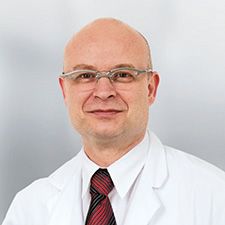Primary brain tumors are classified according to WHO grades from 1 (benign, slow-growing) to 4 (malignant, fast-growing). Benign tumors with a WHO grade of 1 can be treated very well, while tumors with a WHO grade of 4 can be treated but are rarely curable. Brain metastases are secondary brain tumors, i.e. metastases of systemic cancers. This often means that the original cancer is already more advanced. In most cases, metastases are not only found in the brain, but often also in other organs. Cancer at this stage is often no longer curable, but the progression of the disease can be slowed down. In the treatment of brain tumors, it is important that the therapy is individually tailored to your clinical picture and the course of your disease and that you are informed about the possibility of participating in studies with new drugs, especially in the case of incurable diseases. To this end, you should seek treatment at a certified center that specializes in the treatment of brain tumors. In order to provide patients with optimal treatment recommendations, regular interdisciplinary case discussions are held with experts from various disciplines to discuss the patient’s medical history and demonstrate tissue findings and imaging.
Brain tumors: Tumor-specific treatments
The following tumor-specific treatments are used for patients with brain tumors:
- Surgery: This is usually the first step in treatment and initially aims to preserve tissue that can be used to make a clear diagnosis. Other goals of the operation are to remove as much of the tumor tissue as possible without causing neurological symptoms (such as speech disorders or restrictions in the movement of arms or legs). Sometimes, however, the tumor is in an unfavorable location and surgery is not possible because the risk of such side effects is too great. Malignant brain tumors in particular often grow together with healthy brain tissue so that they cannot be completely removed by surgery.
- Radiotherapy: Brain tumors can be inhibited in their growth by high-energy radiation that damages the genetic material of the cancer cells. Several sessions on consecutive days with low radiation doses are usually necessary. However, it is sometimes also possible to administer a high dose of radiation once.
- Chemotherapy: This involves the use of drugs (cytostatics) that damage the cancer cells. Chemotherapy is usually administered in cycles with breaks in between to allow the body to recover. In chemotherapy, several drugs are sometimes used in combination to increase effectiveness. Chemotherapy can be administered as a tablet or infusion.
- Antibodies, specific inhibitors (targeted therapy) and immunotherapies: Antibodies or modern drugs that specifically target cancer cells are increasingly being used or tested in clinical trials. Immunotherapies are also being investigated in clinical trials and are sometimes used in patients with brain metastases in the context of systemic cancers.
- Information on current clinical trials for patients with brain tumors
Brain tumors: Supportive treatments
In addition to tumor-specific treatments, supportive treatments are used for patients with brain tumors, often in addition to the above-mentioned tumor-specific therapies:
- Psycho-oncology: A tumor disease and the need for tumor-specific therapies can affect the soul. Psycho-oncological support can help those affected and their relatives to better accept and cope with their illness.
- Palliative care: The aim of palliative care is to alleviate symptoms and discomfort. Particularly in situations where there is no cure, the most important goal is to maintain the quality of life for the patients concerned.




